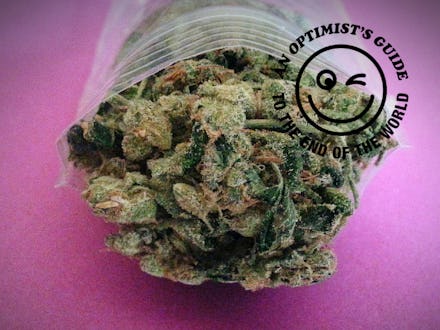How to get high the sustainable way

This article is part of 'An Optimist's Guide to the End of the World,' a collection of stories aimed at disproving the idea that humanity is doomed.
While we're all currently and rightfully embroiled in coronavirus fear, climate change continues to imperil the planet, which is why I’m still making a conscious effort to reduce my carbon footprint — and cannabis consumption is a part of that quest. From choosing where to buy it, to disposing of the packaging, I’ve been trying to make my weed habit as gentle on the environment as possible. Here’s an unofficial guide to a being a sustainable stoner, based on how I imbibe.
I live in California, so I'll be speaking from the legal weed perspective. My first tip is to do some homework to ensure you’re putting your dollars toward dispensaries and brands that employ sustainable practices. Stick to brands that source their weed from outdoor farms or greenhouses, not indoor facilities, which use a ton of energy in the form of lighting and HVAC systems, for instance, per Leafly. Flow Kana, for example, partners with multi-generational farmers in northern California who grow small-batch cannabis organically and under natural sunlight. SPARC, a dispensary and delivery service, also produces sun-grown cannabis on its estate in Sonoma County, California, using organic, biodynamic methods.
If you swear by the ritual of the roll, opt for papers with natural ingredients that don’t impart that weird chemical aftertaste.
Also, consider supporting brands that use sustainable materials, like Besito, which teamed up with Another Room to bring us this 90s dayglo green joint-and-lighter holder, fashioned from plant-based plastic. Another plus: Besito is also committed to an equitable cannabis industry that repairs the devastating impact of the War on Drugs on communities of color. (BTW, cultural sustainability and supporting POC brands is a whole other story — wait for it.)
If you’re more into the airy Joshua Tree aesthetic, this Fruit Fantasy apple pipe from Summerland, maker of hand-crafted, ceramic stonerware, doubles as a chic living room statement piece. The brand’s Pleasure Point bong has a similarly spare, yet earthy vibe. Clean your beautiful, sustainably-made pipe or bong with a non-toxic product, as Westword suggests, like Roots Eco Tonic Tar & Resin Remover, which is made with plant-based ingredients.
If you swear by the ritual of the roll, opt for rolling papers with natural ingredients that don’t impart that weird chemical aftertaste (Karma makes great one), all the better for you to savor the flavors of your go-to strain.
Rolling not your thing? My pick for pre-rolls comes from Aster Farms’ Harry’s Harvest. For every pack sold, the brand. which produces sun-grown, hand-harvested cannabis, will donate $2 to local fire departments in regions affected by the 2018 Mendocino Complex Fire. (The product’s name is a tribute to Harry, a cat lost in the blaze. My heart.)
And if you stan edibles, like I do, Kiva's dark chocolate bars — which contain 5 mgs of THC per serving, and have dark cherry and coffee flavor notes — are my absolute fav. (Call me old-school, but that classic blend of earthy cannabis and sweet, nutty chocolate never fails to slap.) They’re not only delectable, but made with sustainably, responsibly-sourced cacao and chemical-free cannabis concentrates.
If you’re craving something fruity, these raspberry sativa-enhanced gummies from Wyld, a brand that prioritizes engaging in sustainability-oriented service projects, supposedly deliver a breath of energy and creativity. Or sip on Positivi-Tea, a cannabis mint green tea, which the manufacturer, Kikoko, purports to “banish grumpiness,” a must in these angst-ridden times. Kikoko uses organic ingredients, outdoor-, sustainably-grown cannabis, and recyclable, plastic-free tins.
If you have your own faves already, and are curious about how they fare on the sustainability scale, peruse product labels for sustainability certifications. Many of us rely on the USDA certified organic label to identify sustainably-made products (that said, whether organic products really are better for the environment isn't so clear-cut) — but we can’t do the same with weed.
Recycle empty containers, or at least reuse them. I’ve taken a cue from my immigrant mom — who repurposes food containers like no one’s business — and given my Breez Mint tin a new life as an ibuprofen tin.
Since it’s federally illegal, cannabis cannot receive the USDA’s organic certification, according to SIERRA. The good news is, small-scale sustainability certifications for cannabis abound, the magazine notes, although Clean Green Certification has the most name recognition. To get Clean Green Certified, producers need to use natural pesticides, participate in a program to shrink their carbon footprint, and pay farm workers an hourly rate of at least $15, among other requirements.
Recycle empty containers, if possible, or at least reuse them. I’ve taken a cue from my immigrant mom — who repurposes food containers like no one’s business — and given my Breez Mint tin a new life as an ibuprofen tin. But honestly, you can use edible tins to hold any number of random small objects: paper clips, earrings, whatever. Merry Jane has a bunch of other creative ideas, like reusing weed containers as seed starters, or to hold laundry quarters or charging cords.
Just because we’re stuck at home doesn’t mean we’re powerless to make sustainable choices. And given that many of us have found ourselves indulging more than usual to cope with this pandemic, our cannabis consumption is as good an opportunity as any to do so.
Mic may receive a portion of sales if you purchase a product through a link in this article. We only include products that have been independently selected by Mic's editorial team.